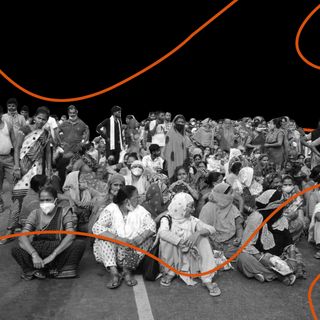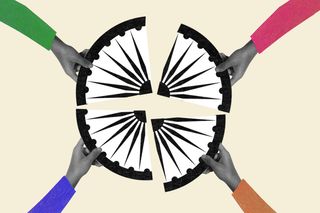
We Asked Six Experts to Explain the Impact of a Uniform Civil Code in Modern India
“What we need is uniformity in rights and not a Uniform Civil Code.”

The demand for a Uniform Civil Code (UCC) — one that streamlines personal laws across religions — was revived again last week. The Delhi High Court, while responding to a divorce petition, stressed the need for a UCC, observing that the traditional barriers of religion, community and caste are slowly dissipating” in modern India; thus, there is a need for a “code — common to all.”
The conversation around the UCC is as old as the creation of India in itself. The UCC is envisioned as a common set of civil laws that govern varied matters of marriage, adoption, inheritance, succession, and divorce for all citizens, irrespective of their religion. Currently, marriage and succession laws among Hindus, for instance, are different in comparison to those for Muslims. The idea of “uniform” principles, however, has been contested by experts, who have challenged the necessity and feasibility of such a law. Others have also noted the UCC can be weaponized to further isolate minority communities and religions.
The Swaddle spoke to experts about what would be the biggest impact of a UCC on Indian culture, society, and rights — and what makes the Indian dialogue around a UCC unique.
*
Arvind Abraham is an advocate with work focusing on human rights, constitutional law, and legislative advocacy.
“[The impact] would depend on two factors, namely the substantive content of a Uniform Civil Code and the process adopted to enact such a code. In terms of content, the aim of a Uniform Civil Code must be to ensure uniformity of rights in light with principles of equality and gender justice. In terms of process, given how personal laws are intrinsically connected with religious beliefs, the UCC must be framed in a transparent manner, after extensive and comprehensive consultations with all types of communities in the country. It cannot be a high-handed majoritarian process, or one which takes Parliament by surprise as was the case with the Article 370 measures. If the UCC sticks to the aforementioned guiding principles, then the UCC can be a step forward. However, if it is treated like a political tool to isolate any community, then it will only deepen the sense of marginalization experienced by vulnerable groups, particularly by religious minorities who have been at the receiving end of Hindutva politics, which harms social relations and national integrity.”
*
Flavia Agnes is a women’s rights lawyer, with work focusing on domestic violence, minority law reforms, secularism, and human rights.
“We have struggled with this issue for a very long time but have failed to adequately address it. Even the Law Commission in its report on personal laws has come out with the finding that a UCC is not needed, and what is needed is reform within each religion to weed out discrimination against women and bring in gender justice. India is a pluralistic country with diverse cultural practices — and uniform law of marriage, divorce, and succession may not be feasible. Even though the [Hindu Marriage Act] was enacted in 1955, there are many rural communities who do not follow it and decide disputes on the basis of their own community traditions and practices. Even women from these communities prefer to go to the local panchayats rather than formal courts as they are alien, distant, and expensive and decisions take a very long time and are not always decided in favor of women. Since issues of marriage, divorce succession, etc. are civil in nature, even if a UCC is enacted, many rural and tribal communities may not follow it and continue with their own tribal and customary practices. So, I am not sure whether a UCC, even if enacted, will change this situation. We also must keep in mind that the formal courts have also not been able to deliver justice in a timely manner, there is not adequate legal aid and litigating in these courts is very expensive and time-consuming. There are enormous delays and huge backlogs. So, people will continue to follow their own customary practices for quick redressal of disputes through a system with which they are familiar.
“Though there are several discriminatory practices within the different personal laws they need to be addressed within the confines of their own personal laws. A UCC will not solve this problem. What we need is uniformity in rights and not a Uniform Civil Code. The issue of arbitrary triple talaq has already been dealt with by bringing in criminal law. So a UCC is not needed to address it. The issue of bigamy/polygamy exists even among Hindus despite a law, and today live-in relationships have complicated the issue further even within Hindu marriages. So, will a UCC solve it?”
*
Saumya Saxena is a former consultant with the Law Commission of India and has researched personal law, gender, religion, and comparative constitutionalism.
“For me, the problem with the UCC is its potentially patronizing template rather than the idea of uniformity itself. As we saw with the Muslim Women’s Protection of Rights on Marriage Act, and the Citizenship Amendment Act, and then the laws criminalizing inter-religious marriages in UP and MP as ‘love jihad,’ many of these legislative interventions target minorities rather than facilitate women’s rights. Various women’s rights organizations have been reiterating this since the late 1990s. The 21st Law Commissions had some recommendations on amendments to personal laws which would potentially be more effective and context-specific than a uniform law.”
*
Alok Prasanna Kumar is the head of the Vidhi Center for Legal Policy, Karnataka. His research area includes Constitutional law and judicial reforms.
“The constitutional intent was never to have a compulsory UCC where there’s only one way to get married, divorced, adopt, and inherit land. In fact, throughout India’s history, no such thing has ever existed under any ruler (with one notable exception – the Portuguese Civil Code applicable and even that was not uniform throughout). World over more and more countries are adopting the Indian model — of having multiple parallel legal regimes co-existing in the context of family law (also called legal pluralism). As societies grow more diverse, it is seen as a hallmark of inclusivity and tolerance and not division. These can also be faith-based with appropriate changes to meet constitutional standards. There’s already a Uniform Civil Code in force – a voluntary if a somewhat incomplete one. It involves the Special Marriage Act, the Indian Succession Act, and the Guardians and Wards Act. It needs to be made more gender-neutral, less homophobic, and more progressive in its provisions. Unfortunately, that seems to be of no interest to anyone in power since the current obsession is to prevent inter-faith and inter-caste marriages and relationships.
“No proponent of the UCC has ever been able to put out a draft Bill for public discussion because there are only two choices when it comes to UCC – compel people of different religions to follow Hindu law or abolish Hindu personal law as we know it. Both are obviously unacceptable but for different reasons. The first coerces people into following the religious practices of Hindus whatever their beliefs and violates freedom of faith and belief. The second would abolish the Hindu joint family system of property ownership and extinguish the property rights of millions of Hindus overnight. Furthermore, it would mean that a lot of women would suddenly find their marital status in doubt and get conned by men into losing their rights. The UCC is a pointless bogey raised in the discussion about family law. It simply diverts attention from more pressing questions of reform and update and offers no solution to any problem and creates many more (however it is drafted).”
*
Radhika Roy is a lawyer with a focus on gender and human rights.
“In a utopian, homogenous society where every individual harbors high regard for their fellow citizens and their subjective choices, UCC would undoubtedly be the way forward. However, in the Indian context, the chances of misuse of UCC are, unfortunately, too great. India prides itself on its diversity. Article 25 envisages the freedom to practice, profess, and propagate your religion. By enforcing a singular law applicable to all citizens, you violate this freedom. Not just that, UCC fails to account for intelligible differentia under Article 14 (right to equality); with a majoritarian government in power, this can potentially lead to laws being promulgated which would inevitably favor the majority religion. By incorrectly hailing UCC as a panacea of all social evils without rectifying the underlying issues, people tend to not realize that the only impact it would have would be the initialization of minority religions and subsequent subjugation of the same.”
*
Vikram Hegde is a Supreme Court advocate.
“The one element of the Uniform Civil Code which is of greatest cause for concern is the stress on uniformity — which comes across as jarring in a country as diverse as ours. At the same time, we cannot overlook the problems posed by the existing set of personal laws. For all their stated diversity, the personal laws do not adequately address the diversity in practice amongst their own communities. The recent comment of the Delhi High Court calling for a Uniform Civil Code, for example, came in a case between two people, both of whom were admittedly Hindus, with the question only being as to whether the Hindu law would be applicable to them or if it would be their customary law. Personal laws have also resulted in counterintuitive instances such as the argument advanced by Mr. Fali Nariman on behalf of the daughter of Mohammed Ali Jinnah that as khoja Shias, the law applicable to the property of Mr. Jinnah would be Hindu law and not Muslim personal law.
“I feel that any call for a Uniform Civil Code is meaningless unless their proposal also puts forward as to what this uniform Civil Code might look like. It obviously does not mean that anyone who demands a Uniform Civil Code must also provide a draft bill. However, even among the supporters of the Uniform Civil Code, there does not seem to be consensus or clarity as to what the guiding principles of the Uniform Civil Code will be. While the impact of a Uniform Civil Code on matrimonial issues has drawn a lot of attention, I feel that the impact of such a code on property and inheritance will be extremely complex and far-reaching. Instead of a Uniform Civil Code, my suggestion is for a common Civil Code with adequate freedom provided to parties to pick the legal systems and terms applicable to them.”
Saumya Kalia is an Associate Editor at The Swaddle. Her journalism and writing explore issues of social justice, digital sub-cultures, media ecosystem, literature, and memory as they cut across socio-cultural periods. You can reach her at @Saumya_Kalia.
Related


UP’s Two‑Child Policy Overlooks Women’s Access to Education As a Population Control Measure
